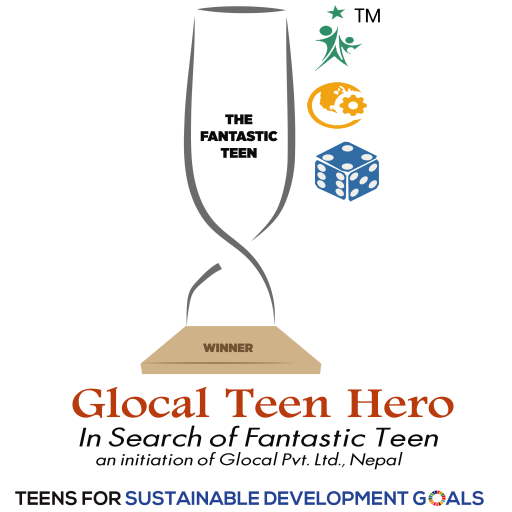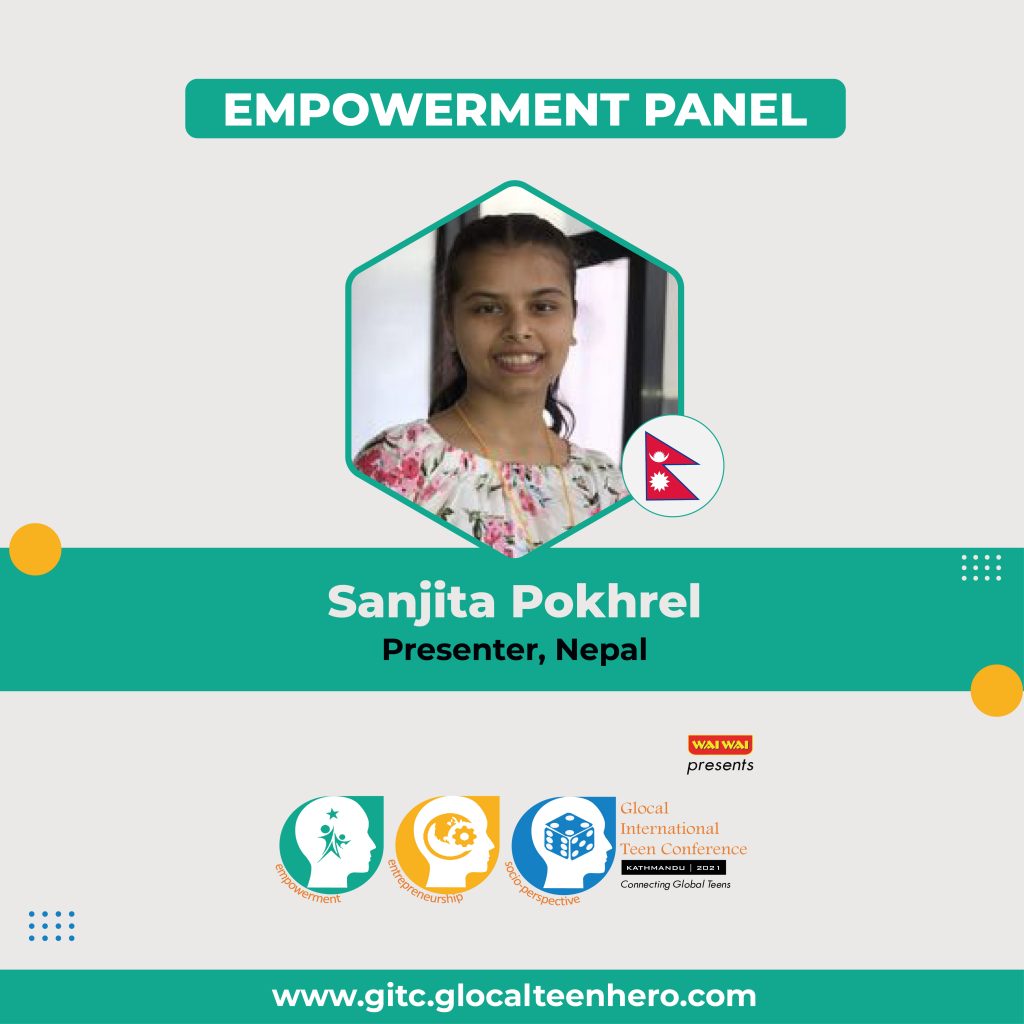GITC: Introduction
Glocal International Teen Conference (GITC) is an opportunity for teenagers to address the issues and overcome the challenges that they have faced in their daily lives. It is a platform for all teenagers from age 13 to 19 to learn, empower, and bring social impact through a participatory and interactive environment with their peers from all over the globe. It is a lifetime experience to connect with the influencing teenager and act for a positive change.
The conference showcased the ideas, experiences, and stories of teenagers from different countries through a series of panel discussions and presentations. The three key issues of GITC are Entrepreneurship, Empowerment, and Socio-Perspective. This Year, Glocal International Teen Conference is being organized virtually.
Presenter for “Entrepreneurship Panel” at Glocal International Teen Conference, 2021
Ms. Khushleen Kaur from India presented her presentation on the “EntrepreneurshipPanel” at Wai Wai Glocal International Teen Conference 2021.
Khusleen Kaur is a detailed-oriented person who enjoys trying unique things. She aspires to support those in need by addressing real issues around the globe. She has initiated a new policy in her school regarding leaves for mental health.
IAYP Program Silver Level- Badminton (physical recreation), Teaching an 8th grader (community service), Cooking as a major (skills), YLAC Counter speech fellowship- 10 week, University Virtual Internship- Psychology, Marketing, Computer Engineering, Assistant teacher Internship at school for 2 months and Participation in Khan Academy’s Breakthrough junior challenge are some fellowships she has taken till the time. She strongly believes hard work pays and has attempted to stand up for this remarkable initiative by contributing to YLAC Counter Speech Fellowship. She always had a passion for movies, dance, and art. Commitment and precision invested in work is the tradition she follows to the core.
Khushleen presented her presentation on the topic of “How to maintain a positive work environment.” She gave insights about the ideas to promote employee bonding, roles in a team project and also highlighted the important characteristics of managing a team.
Synopsis of Entrepreneurship Presentation
Building a team is a two-way street. It is vital to consider that it must agree to not only compensate the employees, but also foster a positive work environment. It shows the employees that they are valued and keeps them motivated to give their best. We will consider the world of work and how individuals and groups within a company function and influence each other and impact the organization itself. Social Psychology may be relevant when considering leadership, quality of working life, group processes, and motivation. The learning approach is vital in examining whether we explain personality characteristics. It is also essential when considering the role of reward and reinforcement in producing workplace satisfaction. We will also consider psychometric approaches and these are attempts to measure personality and cognitive functioning to ensure that people and their organisation roles are well suited.
In business, motivation means the desire of workers to see a job done quickly and well. It results from the individual organisation achieving its objectives as cost-effectively as possible. Motivated workers will also be trying to reach their personal goals. Motivation levels have a direct impact on the level of productivity and thus the competitiveness of the business. They’re more likely to offer more helpful suggestions and contribute in ways other than their contractual obligations. They will often seek responsibility and promotion. All of these benefits have an impact on business efficiency.
The first way is by providing training. Improving and developing the skills of employees is an important motivator. It increases the status of workers and gives them a better chance of promotion to more challenging and probably better-paid jobs within the business. It is also essential to have the incentive for employees to stay with a home as fully developed and appreciated by the organisation. 
The second way is by creating a comfortable environment. Team working makes full use of all the talents of the workforce, better solutions to problems originate and those most clearly connected with the work participate in suggesting unfolds. Teens can develop a set of values and attitudes which may contrast or conflict with those of the organisation itself, particularly if there’s a dominant personality in the group. Teams will need clear goals and assessment procedures to ensure that they’re working towards the objectives of the organisation.
The third way is by checking on employees regularly via meetings. The meetings can be informal and all workers can contribute to discussions and provide feedback on how the firm can improve its work-life balance.
The fourth way is by providing opportunities to learn. Development can take the form of new challenges and opportunities with additional training and promotion with additional dedicated authority and transfers from job enrichment. The HR department should analyse the likely future needs of the business when establishing the development plan for the workforce. In this way, an individual’s progress and improvement can be geared to the needs of the form.
The fifth way is to encourage work participation. Introducing worker participation and different levels of a business operation can improve productivity. Workers can be encouraged to become involved in decision making at the time of workgroup levels. For strategic decision-making, workers could be encouraged to participate by electing a worker representative to speak for employees at a works council meeting.
The final way is to develop strong work culture. Strong culture promotes and facilitates successful strategy implementation. A strong culture means the widespread sharing of popular beliefs, practices and norms within the business and energises the people to promote successful strategy implementation. And that usually happens when the new strategy is introduced.
In organisations, with a V culture employees may have no agreed set of beliefs and there is no pride in ownership of work. There are a lot of ways in which organisational psychologists may be able to benefit an organisation.
Roles in a Team Project
- Thought-Oriented Roles
- People-Oriented Roles
- Action-Oriented Roles
There are three different types of roles which we will look at independently. The first type is “Thought-Oriented Roles”, which consists of Plants, Monitor Evaluators, and Specialists. A plant is a creative person who comes up with new ideas. Plants are often introverted and prefer to work on their own. Their ideas can sometimes be impractical, and they can also be poor communicators. Monitor evaluators are good at analysing and evaluating the ideas that other people propose. These people are objective and strategy. They can be seen as detached or unemotional. Specialists are people who have specialised knowledge that is needed to get the job done. They pride themselves on their skills and expertise, but may sometimes focus on technicalities at the expense of the bigger picture.
The second type of role in a team project is the “People-Oriented Roles”, which includes Team Workers, Resource Investigators and Coordinators. Coordinators are the ones who take on the traditional Team Leader role and guide the team to the objectives. They are often excellent listeners, and naturally able to recognise the value that each team member brings to the table. They are calm and good-natured and delegate tasks very effectively. The potential weaknesses are that they may delegate too much personal responsibility and may be manipulated. Team workers are the people who provide support and make sure that people within the team are working together effectively. These people are negotiators, and they are flexible, diplomatic and perceptive. They tend to be the popular people who prioritise team cohesion and help people get along. They may be indecisive and struggle to commit to a position. The source investigators are innovative and curious. They are enthusiastic team members who identify and work with external stakeholders to help the team accomplish its objective. They are outgoing and people genuinely respond positively to them. However, they may lose enthusiasm quickly.
The last type of role in a team project is “Action-Oriented Goals”. It includes Shapers, Implementers, and Completer Finishers. Shapers are people who challenge the established news and find the best approaches for solving problems. Shapers tend to see obstacles as exciting challenges. Although they may also be argumentative. Implementers are the people who get things done, they turn the team’s ideas and concepts into practical action and plans. They tend to be people who work systematically and efficiently and not very well organised. However, they can be inflexible and resistant to change. Completer Finishers are the people who see that projects are completed thoroughly. They ensure that they have been more mistakes and they pay attention to the smallest of details. They are very concerned with deadlines and push the team to make sure the job is completed on time. They are described as perfectionists and memory unnecessarily and find it hard to delegate.
Important Characteristics of a Management Team
Some of them are definitely excellent communicators, strategies can approach, responsibility and accountability. Team plans, individual thinkers and critical problem solvers are some of them as well. A business aim helps to direct, control and review the success of the business activity. In addition for the aim to be successfully achieved, there has to be an appropriate strategy or a detailed plan of action in place to ensure that resources are correctly directed towards the final goal. The strategy should be constantly reviewed to check whether the business is on target to achieve its objectives. 
I would like to conclude with a quote by saying “Coming together is the beginning. Keeping together is progress. Working together is a success.” Have a nice day!

